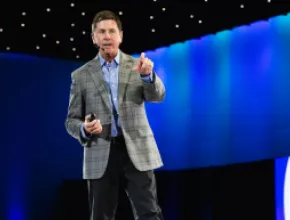Gen Z is coming and meeting planning will never be the same.
“Never before has there been a generation incapable of remembering a world without the Internet,” said Christopher Wolf, a Goldman Sachs researcher who focuses on the financial consequences of differences between the generations. “This is the most diverse generation in U.S. history and the first to be born with a digital device in their hands. And they are becoming the largest generation.”
If you don’t have any Gen Zers in the family, get ready for a steady stream of surprises. The oldest of the generation born after 1996 is entering the workplace and beginning to attend both corporate and association events. Different researchers use different names, Generation Z, iGeneration, Centennials. By whatever name, the latest generation to enter the workforce is more than 70 million strong and they will dominate the workforce by sheer numbers in a few short years.
“Where leaders have gotten into trouble with generations in the past is trying to debate who is better, worse, right or wrong,” said generation researcher David Stillman, co-founder of GenZGuru.com. “The leaders, and the organizations, who accept that it is not about which generation is better and instead embrace how each generation is different are the ones who come out ahead. Planners who recognize the differences Gen Z brings to the meetings and event world and embrace those changes will win.”
What about planners that continue business as usual? Don’t expect an apocalypse, Stillman said. Expect death by attrition.
If your ultimate strategy is to kill the meeting when the current attendees die or retire, that’s fine,” he said. “But most planners and event sponsors want a strategy to keep events alive and vibrant and well-attended. The clear business case to make is that if we don’t pull these people into our events, we don’t have a future because Gen Z won’t attend. Evolving meetings and meeting planning is investing in your own continuing success. Gen Z is your future”
Tech First and Last
Attitudes toward technology are the most obvious difference between Gen Z and their Millennial siblings or parents. Older generations accept technology and gradually adopt new innovations. Gen Zer’s expect technology. The latest technology.
“In my time, I’ve used records for music, eight-tracks, cassettes, mp3s and Apple Music,” said Gen Y tech strategist Crystal Washington, founder of CWM Enterprises. “I’ve lived the progression to digital, but Gen Z was born into digital. They were born into a time when virtual reality games are real. They had augmented reality storybooks, point your phone at a book and a whole storyboard pops with characters dancing round the real world as you turn the pages of the book. This is their interactive world. As Gen Z enters the workplace in huge numbers, you can’t afford not to have highly interactive meetings. Gen Z is the death of two dimensional meetings.”
David Stillman and his Gen Z son Jonah Stillman took a deep dive into Gen Z for their latest book, Gen Z @ Work. Gen Z doesn’t just expect technology at work and at meetings, they assume it will part of the mix. For kids who learned to navigate a tablet as they learned to talk, Internet access, of course, is a must.
“We have only known phones that are smart and have always been able to get our hands on any bit of information 24/7,” Jonah recently told the Society for Human Resource Development. “Since ninth grade, I have had an iPad at school. It used to be that you looked to teachers for answers, the ‘sage on stage.’ We look to Google for answers. We still need help sifting through at analyzing those answers—a ‘guide on the side.’”
Gen Z attendees bring the same expectation of a guide on the side to meetings. Information is no longer the key to success because anyone can get any odd bit of information at any time from anywhere. The key to success is turning information into something useful and putting it to work efficiently, effectively and quickly.
Reality Is Hybrid
The need for improved access and more transparency have pushed planners to put more and more events online, whether streamed live or made available for later viewing. Gen Z is taking the combination of real world and virtual worlds a step farther. They live what David Stillman calls a phigital live, an ever-changing combination of physical and digital.
When it comes to shopping, Gen Z draws no distinction between the physical store and the virtual store. Shopping is shopping and one channel is as good as another, depending on the time, the place and the need. But digital is easier.
In education, Gen Z sees no distinction between learning in a physical class room or online. It’s all learning and the more you can learn, the more likely you are to succeed. And it’s a touchpoint for planners.
If story books and cereal boxes can include digital elements that add to the experience, so can meeting materials. Meeting programs can, and should, include hot links to speaker bios, websites and videos, whether the program is viewed online, in an e-mail or on paper.
“When attendees are used to interacting digitally with the real world around them, they expect to do the same thing at a meeting,” Washington said. “Gen Z is all about immersion and interacting with their environment. Merging the physical and the digital takes learning a step deeper.”
Phigital programming is already a reality. Washington works with library systems to bring famous authors to local libraries via social media and video. Some planners already use video links for presenters who unexpectedly cannot make an event in person. Adjusting the planning process to include digital presentations from the other side of the country—or the world—is an easy next step. Gen Zer’s expect it, and attendees of every generation benefit.
Engaging Gen Z
Gen Z’s native-born dexterity putting technology to work is a valuable asset for planners who are willing to engage. So are many of the group’s other common traits, including curiosity, drive, ambition, self-motivation, do-it-yourself learning and practicality. Gen Z came of age during the Great Recession. They know first-hand that there are winners and losers in life and they want to come out winners. They expect to invest time, energy and money in their own futures, but they want to see the potential return.
“If all you pitch for your event is education, they are going to tell you they already learn anything from programming to baking on YouTube,” Stillman said. “If you have never been to a meeting before, the benefits may not be obvious. You have to connect the dots very clearly between the time and money they are investing in attending the meeting and what they will get out of it. Show them the practical benefits of attending and you won’t be able to keep them away.”






